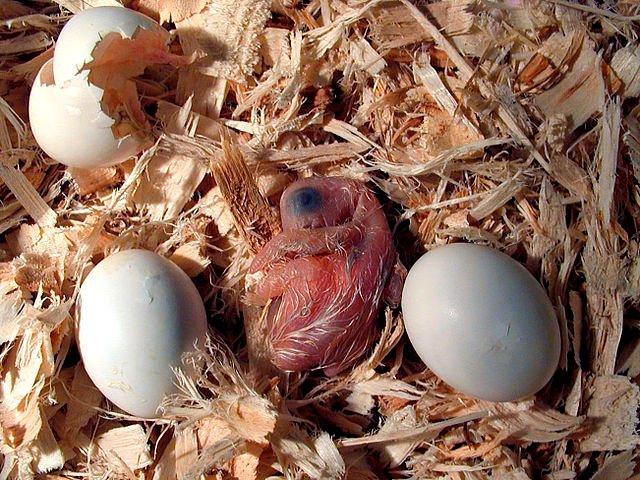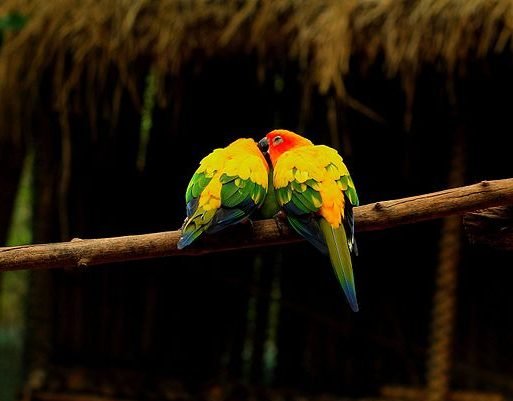Covered with bright yellow colored feathers with slight orange and reddish tinge on feathers, sun conures aren’t always as bright as the sun. It is only at around 18 months old that they attain their adult plumage. But when these medium-sized birds are in their infancy, they look like an altogether different species.
Covered in a green plumage all over their head, back, and abdomen, they lose all their baby feathers as they near maturity. But sun conure babies aren’t all about beauty. They are little sensitive beings that need care and attention to grow into healthy and active adult suns.
Raising Sun Conures
Raising suns would need a little knowledge on the owner’s part of all the rights and wrongs for rearing the chicks perfectly. When one adopts a sun conure baby or his sun conure pair gives birth to little chicks, there are multiple ways an owner can choose to raise those little suns.
Parent-raised Sun Conure
One way to raise sun conure baby birds is to leave them to their parents and let the sun conure pair feed and raise them as they do in the wild. The owner must not interfere with the parents raising the babies. The chicks will start growing quite fast and their pin feathers will soon emerge and they will be fed by their parents until they are two months old and fully weaned.
The parent-raised chicks will have all the behavioral impressions of their parents and they will be more comfortable living with their flock. Hence, it is difficult to tame parent-raised chicks. Additionally, they also fetch less price due to their known discomfort with human species. Though these chicks form great stock for breeding purposes and need much less effort on the breeder’s part to mate and breed them.
Hand-raised Sun Conure
Most in demand, the hand-raised sun conures are the most compatible pets since they are raised with the ideology that humans are their flock too. To hand-raise a sun baby, he is removed from the nest as soon as he is hatched. But it is best to pull him away from his parents when he is around 3 or 4 weeks old. The reason for this is that sun conure babies are very weak when they are born and it is better to let the parents feed him for some time and make them a little healthier. There have been instances where the breeders have lost the chicks when they were just a few days old, due to incorrect brooder temperature or improper diet.
Hand-raising chicks need expert guidance for monitoring diet and other daily needs. For instance, the chicks are fed a special sun conure baby food with a syringe multiple times a day. This feed must have all the nutrients in a perfect balance.
Also, the brooder in which the chicks are kept must be adjusted for appropriate temperature throughout the day and night. Any lag in all such raising essentials may cost the owner his chick’s life.
Co-parented Sun Conure
A balanced mix of both the above methods of raising chicks, co-parenting is a combined raising effort of both the sun parents and the owner. The sun conure baby is left with the parents after he hatches from the egg and is taken out of the nest for hand-feeding a few times in a day. The rest of the tasks of keeping the babies warm and taking care of them are done by the parents inside the nest, thereby, saving a considerable amount of time and effort of the owner.
But this way of raising chicks is possible only when the sun-parents are tamed themselves and are bonded well with the owner, hence, trust them. Otherwise, it might make the parents aggressive and in the worst scenario, the male sun might end up killing his chicks to protect them from the owner.
Read about Sun Conure Gender Difference:
https://parrotquaker.com/sun-conure-gender-difference/
Sun Conure baby growth Stages
A sun conure attains sexual maturity by the age of 2 years. Prior to that, a sun conure baby growth has various stages. If taken note of feathers even in sun conure baby pictures carefully, one can clearly tell the age of the bird.
0 to 6 months old Sun Conure
When a sun conure baby is born, he hardly has any feathers. As he gets a few weeks old, one can notice his pin feathers emerging. The first plumage of a sun conure is of olive green color So, if a sun conure has majorly olive green feathers over his back, abdomen, and head, he surely is less than 6 months old.
7 to 8 months old Sun Conure
This is the stage of the sun’s first molt. All his green feathers will shed gradually and will eventually be replaced by new ones. The bird will shed symmetrically on both sides of his body.
8 months to 1 year-old Sun Conure
If the baby bird has small patches of light yellow or orange feathers spurting out from the head which haven’t grown long enough to cover his neck, he is around a year old.
1 to 2-year-old Sun Conure
If the bird has long feathers of bright yellow or orange color covering his head, neck and rest of the body, except his wings, the sun is well past his infancy stage and has attained maturity.
Sun Conure Baby Behavior
Just like any other species, a sun conure baby parrot also learns what he picks from his surroundings while being raised. If the bird is hand-raised, he will certainly behave differently than a parent-raised sun baby.
If the sun conure baby has been hand-raised, i.e., pulled out from the nest before he starts learning from his parent’s reaction that humans are a different flock than birds, such birds’ behavior is very calm and they are very cuddly with their owners. They quickly adapt to the human as their family member and look forward to their care and attention.
If the sun conure baby has been parent-raised, he would have already learned to sense fear when a human approaches. Such birds get uncomfortable in human presence and scream and screech a lot and run away when their owners try to even hand-feed them.
Buying a Sun Conure Baby
Sun Conures have attracted quite a fan-base due to their lively nature and colorful appearance which has, sadly, led the species to the edge of being endangered. This is the reason that buying a sun conure would need certain research to avoid any legal complications.
- The first thing to keep in mind while buying a sun conure is that the bird shouldn’t be bought from the international market as it’s sale and purchase has been banned internationally and attracts penalties. Additionally, the purchase must be effected from a registered breeder only.
- Once, a registered breeder in one’s own country has been finalized, the next consideration is the price one is willing to pay for the bird. A sun conure baby price is relatively less than an adult sun conure price.
- If one prefers baby sun, then one has to keep in mind all the facets of the sun conure baby care. From learning sun conure baby feeding to other such acts of raising. It is important to bear in mind that buying the bird at this stage is risky and many owners end up losing the little chicks early on. So, always look for all the sun conure baby tips.
- The safest time to buy a sun conure is when he has attained adulthood after being hand-raised. Such a bird will be resilient to change in his surroundings and would be comfortable around humans.
- Sun Conure adult price would be anywhere between $400-$600. Usually, sun conure baby cost will be less than this almost everywhere across the globe.
Final Words
Adopting a bird pet is a personal choice and so are the other related decisions. But it is always better to have a pet who is just a member of the family than the one who is just trying to fit in. And for that, what better than hand-raising a bird from his infancy days. This way, he will always see the human not as his owner but as his parent.
And when he carries this thought along while being raised, this maps onto the owner’s mind. He also takes the bird as part of his family and treats him just his kind. From taking care of the little sun baby to scolding him just like his own baby, the bond gets beautiful and stronger with each day. The best companionship is born then, simply from pure love and care for each other.





